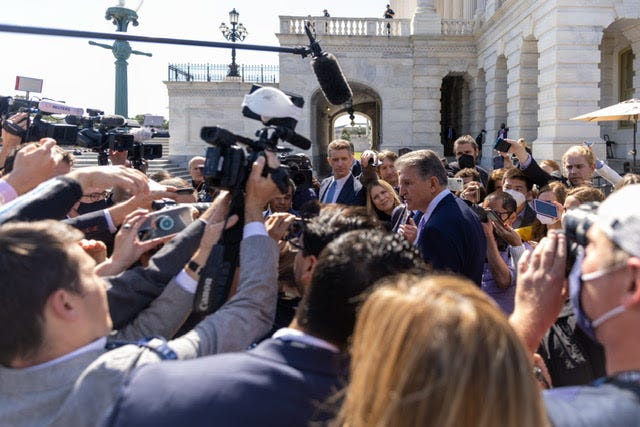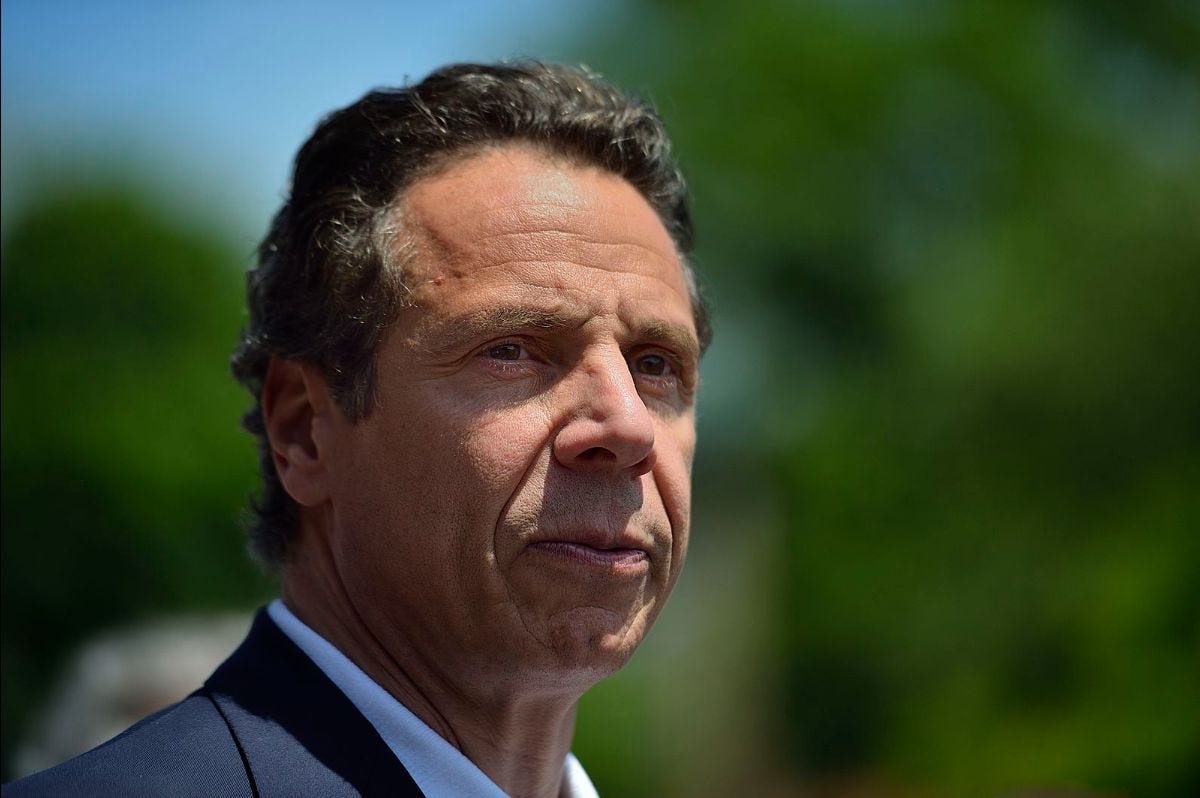Wake Up To Politics - December 15, 2021
Wake Up To Politics: Senate Dems arrive at a crossroads
by Gabe Fleisher
Good morning! It’s Wednesday, December 15, 2021. Election Day 2022 is 328 days away. Election Day 2024 is 1,056 days away.
Senate Democrats arrive at a crossroads
As the year winds down in Washington, D.C., lawmakers are ticking through their last to-do items.
Earlier this month, they extended government funding through February 18, averting a shutdown. On Tuesday, both chambers voted to raise the debt ceiling by $2.5 trillion, putting the threat of a default off the table until after the 2022 midterms. (The debt ceiling votes were almost entirely along party lines, with one exception: Rep. Adam Kinzinger, an Illinois Republican, joined Democrats in supporting it.)
Today, the Senate will vote on the National Defense Authorization Act, which sets the policy agenda for the Defense Department and authorizes almost $770 billion in funding for the agency. The annual package passed the House last week, in a 363-70 vote, so it will go to President Biden’s desk along with the debt ceiling bill.
Anxious to go home for the holidays, members of Congress are moving quickly to wrap up their unfinished business. The House left town for the year on Tuesday, after checking off some final priorities — both partisan (holding former Trump aide Mark Meadows in contempt of Congress) and bipartisan (banning imports from China’s Xinjiang region, where the Chinese government is keeping more than 1 million Uyghur Muslims in forced labor camps).
But on the other side of the Capitol, the Senate remains in session, as Democrats fret about whether a pair of long-held priorities will make it to the floor by the end of 2021: the Build Back Better spending package, and legislation to protect voting rights.

According to a Politico report, Senate Democrats are split on whether to prioritize the spending bill or voting rights. With a voting rights bill presumed dead unless Democrats make changes to the Senate rules, Build Back Better has been Priority No. 1 up until now — but as Sen. Joe Manchin (D-WV) continues to withhold his support, some Democrats are growing restless and advocating for the party to make progress on at least one of the two issues before leaving for recess.
“Voting rights should be the very next thing we do,” Sen. Raphael Warnock (D-GA) told reporters on Tuesday. “We’ve got to get Medicaid expansion, we’ve got to get child care, we’ve got to get relief to farmers. All of those things matter. But the point I’m making in this moment is: we have to have a democratic framework to continue to push for those things.”
But both voting rights and the spending package face the same obstacle: Manchin. Just as he has yet to grant his support to Build Back Better, the West Virginia centrist — who was profiled this morning in the Washington Post as “President Manchin” — also remains opposed to modifying the Senate filibuster rules, which would be needed to advance a voting rights bill over unanimous Republican opposition.
That has placed Manchin at the center of both debates, and made him the target of seemingly endless persuasion efforts from his colleagues. “The dynamics are interwoven,” Sen. Elizabeth Warren (D-MA) told Politico, referring to the spending and voting rights bills. “There’s no policy reason they have to be linked, but they do come down to the same person.”

True to form, Manchin has been tight-lipped about where he stands on either agenda item. He spoke to President Biden on both Monday and Tuesday about Build Back Better; all he would tell reporters on Tuesday about the phone calls is “we’re just still talking” and “we’re still agreeing to negotiate.” (Per Axios, Biden and Manchin are “locked in a disagreement” over how long programs in the spending bill should be funded; Manchin is also reportedly wavering on the Child Tax Credit, a major portion of the package.)
But with time running out, it’s seeming less and less likely (although still possible) that Build Back Better will be approved in the Senate by Christmas, as Democratic leaders had hoped. According to Roll Call, optimism is “waning” among Senate Democrats on whether that goal is still possible, especially considering the procedural hoops they still must jump through — for one, the Senate parliamentarian has not yet finished scrubbing the bill to ensure it’s in compliance with the chamber’s rules.
As for voting rights, Manchin seems even less prepared to give his blessing. Asked if he was prepared to support a party-line vote to change the Senate rules, Manchin told reporters Tuesday: “All my discussions have been bipartisan... A rules change should be done to where we all have input, because everyone has to live with it. Because we’re in a minority sometime, then the majority. Back and forth.”
Spoiler alert: No bipartisan consensus on modifying the filibuster is coming any time soon, no matter how hard Manchin tries. Which means Democrats might just be going home for the holidays empty-handed — no spending package, no voting rights bill — despite months of pouring focus into the two priorities.
What else you should know
→ Covid. As the official count of Covid deaths in the U.S. surpassed 800,000, some Biden administration officials are warning that a “large wave” of cases driven by the Omicron variant is imminent.
→ Trump probes. A federal judge gave the greenlight for House Democrats to obtain former President Donald Trump’s tax returns, a ruling Trump says he will appeal. Meanwhile, Trump’s longtime accountant reportedly testified before a New York grand jury investigating the ex-president’s business practices.
→ January 6. Washington, D.C. Attorney General Karl Racine announced that he is suing the Proud Boys and the Oath Keepers, two far-right groups, for their roles in the January 6 attack.
→ Cuomo. A New York ethics board found that former Gov. Andrew Cuomo (D-NY) violated state law in writing his memoir and ordered him to turn over the $5.1 million he made from the book deal.
Policy Roundup: Global
Every Tuesday, Wake Up To Politics contributor Miles Hession offers an overview of the week’s top international news. This week, he’s focusing on the changing face of European politics.
The European Union turned inwards as leaders seek out a more empowered E.U. in 2022 in the face of external threats. With the reintroduction of many physical borders, a beleaguered bureaucracy hampered down by the demands of a massive vaccine program, and growing provocations from Russia and the U.K., the E.U. looked divided and vulnerable in 2021. Ahead of the new year, though, the stage is being set for a stronger and more autonomous E.U., with French president Emmanuel Macron doing much of the preparations.
Macron spent much of 2021 making high-profile nationalist moves ahead of elections in 2022, like changing the colors of the French flag or a recent tiff with the British over fishing rights. While Macron is favored in the elections, he has consistently been outflanked on his right throughout his time in office which has likely played a role in the emergence of these nationalist stances.
The E.U. works its way into the political calculus as Macron is set to become the bloc’s rotating leader at the start of the new year, which will grant him expanded powers as he makes a case for a stronger Europe that can better respond to security threats. There is a proposal to make the E.U. more resilient against economic coercion like sanctions, giving the bloc a boost of collective independence. With Macron’s direct appeals to a European identity, and a leadership role left void by Angela Merkel, he could quickly ascend to become the bloc’s de jure leader.

Macron has not been alone in his quest to expand the E.U.’s power. Newly installed German Chancellor Olaf Scholz has echoed Macron’s calls for a stronger E.U., and has gone further with his new government coalition agreement mentioning an ultimate goal of a federal Europe. While German foreign policy has been more beholden to the U.S. for military support, ahead of further negotiations over the Nord Stream 2 pipeline, Germany would benefit from more independence from the U.S. as the U.S. seeks to impose on the deal.
While the Nord Stream 2 pipeline has added a wrinkle into the fault lines, Russia has served as a unifying existential threat to the E.U. amid new provocations from Vladimir Putin continues to provoke. With the troop buildup in Ukraine, Macron signaled gratitude for the existence of NATO in staving off an invasion, but emphasized the need for a stronger European response first before seeking out other allies.
While Poland and the E.U. have been at odds over many human rights issues, Poland has been pushed closer to E.U. leaders as border tensions with Russia continue to simmer. With new rules being examined, like changes to the open border arrangements of the bloc, the E.U. signaled a willingness to to adapt and evolve, and E.U. leaders appeared to have the political capital to do so.
Daybook
All times Eastern.
→ President Joe Biden will receive his daily intelligence briefing at 8 a.m., before traveling to Kentucky to survey the damage from the recent tornadoes. He will depart the White House at 9 a.m. and arrive in Kentucky at 11:10 a.m.
At 11:35 a.m., Biden will take an aerial tour of Mayfield, Kentucky, one of the communities hit hardest by the tornadoes. At 12:25 p.m., the president will receive a briefing from local leaders on the impacts of the tornadoes and extreme weather. At 1:45 p.m., he will tour a neighborhood in Mayfield.
At 3:30 p.m., Biden will tour a neighborhood in Dawson Springs, Kentucky, to see more tornado damage. At 4 p.m., he will deliver remarks on his administration’s response to the tornadoes and extreme weather. At 5:40 p.m., Biden will depart Kentucky, arriving back at the White House at 7:30 p.m.
→ First Lady Jill Biden will participate in a Forbes “50 Over 50” event on women’s mentorship at 1 p.m. She will then travel to Wisconsin with Second Gentleman Doug Emhoff and Surgeon General Vivek Murthy.
At 5 p.m., Biden, Emhoff, and Murthy will visit Children's Wisconsin in Milwaukee, where they will meet with victims of the Waukesha Christmas parade tragedy, children who just received their Covid-19 vaccine, and frontline health care workers who have treated Covid patients throughout the pandemic. Biden, Emhoff, and Murthy will all deliver brief remarks.
At 7 p.m., the trio will visit with families of victims and first responders from the Christmas parade tragedy at Waukesha City Hall. Biden and Emhoff will deliver brief remarks, before departing Wisconsin and returning to Washington, D.C.
→ White House Principal Deputy Press Secretary Karine Jean-Pierre will hold a press gaggle aboard Air Force One during the flight to Kentucky.
→ U.S. public health officials will hold a press briefing at 11 a.m. on the Covid-19 response. Participants will include Dr. Anthony Fauci, the president’s chief medical adviser; Dr. Rochelle Walensky, the CDC direcotr; and Jeff Zients, the White House Covid-19 response coordinator.
→ The Senate will convene at 10 a.m. The chamber is scheduled to hold a final vote on S. 1605, the National Defense Authorization Act, at 11:30 a.m., followed by a vote to confirm Jennifer Sung as a U.S. Circuit Judge for the Ninth Circuit.
At 2:15 p.m., the chamber will hold a vote to confirm Samantha Elliott as a U.S. District Judge for the District of New Hampshire.
→ The House is not in session.
→ The Supreme Court will not meet today.




